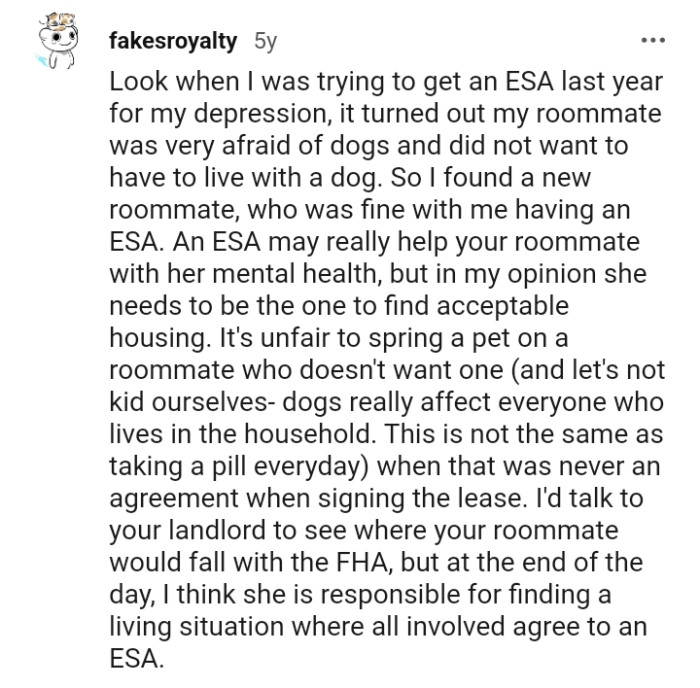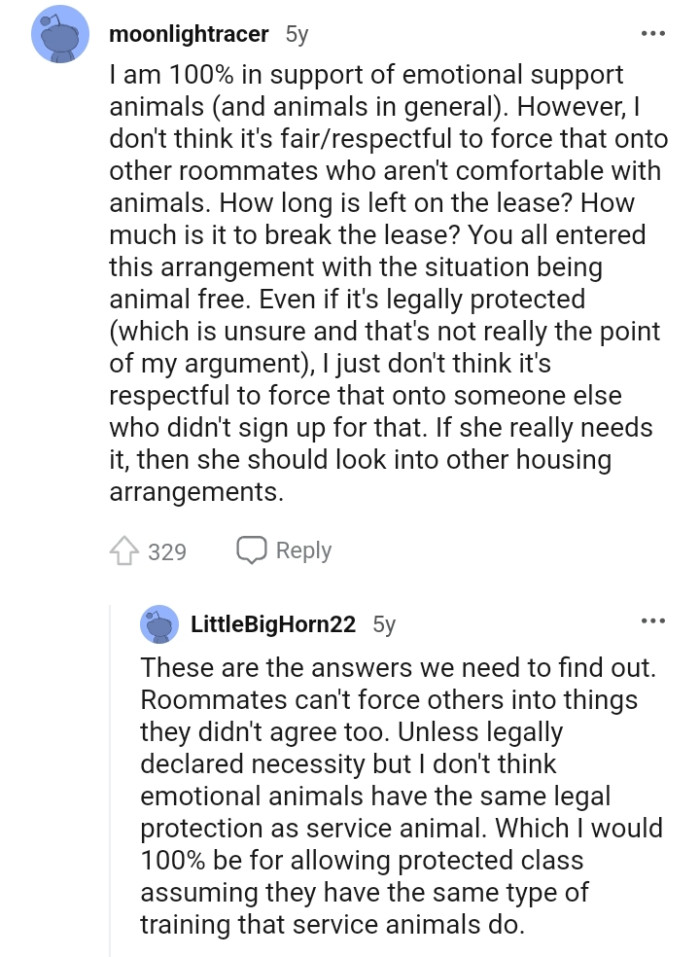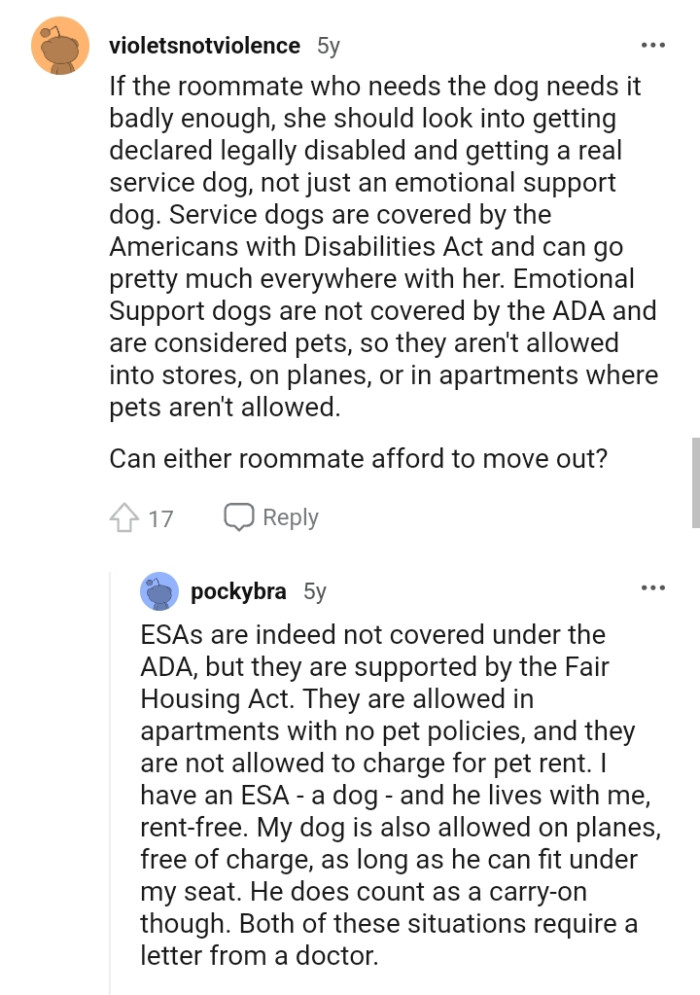Quarrel Looms As Woman Refuses For Her Roommate With Severe Anxiety And Depression To Get Emotional Support Dog
The medical treatments for depression that are most frequently used today include antidepressants, transcranial magnetic stimulation (TMS), and psychotherapy. However, although medical therapies aim to affect the brain's neurological and chemical activities, and psychotherapy often focuses on the patient's interpersonal and internal dynamics, the benefits of having a reliable support network may be overlooked.
Because of this, many patients struggling with depression symptoms that interfere with their ability to function on a daily basis find themselves caught between numbing despair and therapy alternatives, whose slow effects can take time to manifest. Support animals provide a different kind of emotional support, with an almost immediate sense of visceral comfort.
Animals used to alleviate harmful emotional or mental health disorders are known as emotional support animals, or ESAs. Additionally, they are referred to as companion animals, as emotional support animals have been demonstrated in studies to be beneficial in treating depression.
When confronted with an emotionally dangerous situation, having a familiar animal to turn to can help calm any mounting anxiety. The OP of today's story discusses one of the girls she shares an apartment with who has severe depression and anxiety.
According to the OP, she has had to increase the dosage of all her medications and has really struggled. The roommate's doctor and her family believe that getting an emotional support dog would really help her.
The problem is that one of the other roommates has refused, claiming she's allergic, but the OP believes she's lying.
The OP writes

One of the OP's roommates lied about being allergic just because she doesn’t want a dog around

We've gathered a bunch of the topmost comments from other Redditors for you to read through below

The Role of Emotional Support Animals
Research from the Journal of Clinical Psychology shows that emotional support animals (ESAs) can significantly reduce symptoms of anxiety and depression for many individuals.
These animals provide not only companionship but also a sense of safety and stability, allowing individuals to navigate their emotional challenges with greater ease.
Furthermore, studies indicate that interacting with animals can lower cortisol levels (the stress hormone) and boost oxytocin, promoting feelings of calm and connection.
Understanding the Complexities of Emotional Support
Dr. Alicia Tran, a clinical psychologist specializing in anxiety disorders, notes that the refusal of the roommate to accept an emotional support dog stems from a deep-rooted aversion that could be linked to past experiences with animals or personal trauma.
Research shows that individuals with anxiety often have heightened sensitivity to their environment, making the introduction of a pet a potential source of stress rather than comfort.
Can she get something a bit smaller?

One of them should get the option of moving out

An Emotional Support animal might really help the roommate with her mental health

The resistance to having an emotional support dog in shared living spaces can often stem from deeper psychological issues, such as fear of commitment or attachment styles that favor independence.
According to research published in the Journal of Personality and Social Psychology, individuals with anxious attachment styles may struggle with sharing their space and emotional resources.
It’s essential to recognize these underlying factors to foster a more compassionate dialogue about the emotional needs of all roommates involved.
Studies on emotional support animals highlight the therapeutic benefits they can provide, particularly for individuals struggling with anxiety and depression.
According to the Journal of Affective Disorders, interactions with animals can increase levels of oxytocin in the brain, promoting feelings of calm and safety.
They all entered the arrangement with the situation of being animal-free

Another Redditor asking if the roommate can get another support animal

This Redditor had this to tell someone who thought the OP should seek legal advice:
She's not looking for legal advice, though; she's looking for relationship advice on how to handle this situation that will potentially blow up the household.
Even if it is legal, bringing a dog into a house where everyone agreed on no dogs is a massively inconsiderate thing to do.
A word of warning from someone who also doesn't like living with animals

Navigating Roommate Dynamics
Conflict in roommate situations often highlights the importance of clear communication and boundaries.
According to social psychologists, establishing mutual respect and understanding in shared living environments can mitigate stress and promote harmony.
Techniques such as active listening and assertive communication can help roommates articulate their needs while respecting each other's emotional boundaries.
Navigating Compromise and Boundaries
From a behavioral standpoint, this situation highlights the importance of communication and compromise in shared living situations.
Research suggests that establishing clear boundaries and mutual agreements can foster a healthier living environment, especially when one roommate's mental health needs are involved.
Having a cat can be very helpful for their owner's mental health

The only thing that isn't guaranteed is housing and sometimes flying

Emotional Support Dogs are not covered by ADA, according to this Redditor

Research shows that anxiety and depression can create a ripple effect on interpersonal relationships.
When one roommate is struggling, it can lead to misunderstandings and resentment, particularly if the other party feels their needs aren't being considered.
It's vital to foster an environment where both individuals feel safe expressing their feelings, as this can lead to a more empathetic and supportive living situation.
Practical steps for resolution could include open discussions about the specific fears or aversions the roommate has towards dogs, as well as exploring alternative forms of emotional support that do not involve live animals.
Engaging in family therapy or mediation could help facilitate these conversations, encouraging both roommates to express their needs and come to a mutually agreeable solution.
The security of having an ESA around can help people de-stress even more, which is good for everyone's well-being. The OP states that in order for one roommate to buy out their individual lease, it would be $7,200, so breaking a lease is not really an option for either one.
They all live in a college town that has a severe housing shortage, so drop your advice for the OP in the comments below.
The Role of Empathy in Conflict Resolution
Empathy plays a crucial role in resolving conflicts, especially in emotionally charged situations like this one.
Studies show that actively listening and validating each other's feelings can significantly reduce tension and foster understanding.
Psychological Analysis
This situation reflects common challenges in roommate dynamics, especially when mental health needs are involved. The refusal to accommodate an emotional support animal can indicate deeper issues regarding personal boundaries and comfort levels, which are critical to address in a supportive manner.
Analysis generated by AI
Analysis & Alternative Approaches
According to research from the American Psychological Association, effective communication and empathy are key to resolving conflicts in shared living situations.
Therapeutic approaches that prioritize understanding and compromise can lead to healthier relationships among roommates, especially when mental health is at play.
Practical Solutions for Roommate Conflicts
To address the tension surrounding the emotional support dog situation, a structured conversation might be beneficial.
Setting aside time for a calm discussion, possibly facilitated by a neutral third party, can help both roommates voice their feelings and explore compromises.
Additionally, a shared agreement on communal living rules, including pet ownership, can help clarify expectations and reduce conflict.
Psychological Analysis
This situation underscores the complexity of living with someone who has mental health struggles, as well as the impact of personal preferences on shared spaces.
From a psychological standpoint, it’s essential to recognize that both parties are navigating their own emotional landscapes, and finding common ground is key to resolving conflicts.
Analysis generated by AI
Analysis & Alternative Approaches
In summary, understanding the emotional dynamics at play in roommate conflicts can help both parties navigate their feelings more effectively.
Research indicates that fostering open communication and mutual respect is crucial for maintaining healthy relationships in shared living situations.
Ultimately, emotional support animals can serve as valuable allies in coping with mental health challenges, provided all parties involved are amenable to their presence.



